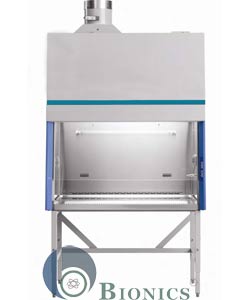The Qualities of an Ideal Class 2 Biosafety Cabinets
The Qualities of an Ideal Class 2 Biosafety Cabinets
Blog Article
Enhancing Laboratory Safety with Class 2 Biosafety Cabinets and Microbiological Protection

Maintaining a safe lab environment is crucial in today’s advanced research and clinical setups. Whether it's biotech development, pharmaceutical research, or microbiological analysis, biosafety cabinets form the backbone of contamination control.
Class 2 Biosafety Cabinets are widely adopted for offering three-way protection. These units are essential for labs working with infectious materials or clinical diagnostics.
Biosafety Cabinets – How They Work and Why They Matter
Biosafety cabinets are ventilated enclosures built to protect both users and biological materials. They use HEPA filtration to remove contaminants from incoming and outgoing air.
These units are generally classified into three main types: Class I, II, and III based on containment level. Among these, Class II units strike a balance between user, product, and environmental protection.
What Are Class 2 Biosafety Cabinets?
Class 2 Biosafety Cabinets ensure safety on all fronts—personnel, workspace, and biological material. They utilise downward laminar airflow within a sealed system.
Both incoming and outgoing air are HEPA-filtered to maintain sterility and prevent leaks. These cabinets are ideal for work involving moderate-risk pathogens (BSL-2/3).
Key Features of Microbiological Safety Cabinets
A Class 2 microbiological safety cabinet includes several critical technologies such as:
• HEPA/ULPA filtration to trap microbes and particles
• Laminar airflow that minimises disruption and contamination
• Pressure differentials that maintain internal containment
• Germicidal UV lamps to disinfect the work area
• Low sound emissions to reduce fatigue
• Transparent sash or viewing window microbiological safety cabinet for easy access and monitoring
These elements support lab workers in maintaining sterile working environments.
Industries and Labs That Rely on Microbiological Safety Cabinets
Class 2 Biosafety Cabinets are commonly used across microbiology, biotechnology, diagnostics, and pharma. They are indispensable for handling clinical specimens, blood cultures, and biological reagents.
Whether in hospitals or drug manufacturing, these units are essential for clean procedures.
Advantages of Installing Class 2 Cabinets in Your Lab
Using Class 2 cabinets offers significant improvements in contamination control and user safety:
• Prevents contamination during sensitive procedures
• Shields operators from harmful aerosols and pathogens
• Improves environmental safety by filtering outgoing air
These cabinets support biosafety goals while improving lab productivity.
Regulatory Standards for Class 2 Cabinets
Top manufacturers ensure their cabinets meet certifications like NSF 49, EN 12469, and WHO recommendations. Class 2 units are sub-classified as A1, A2, B1, and B2—based on varying airflow balance and ducting needs.
• Type A2: Ideal for general-purpose labs
• Type B2: Suited for labs dealing with toxic agents
Matching the cabinet type to your process is essential.
Tips for Purchasing the Ideal Biosafety Cabinet
Before purchasing, consider:
• The biosafety level required (BSL-1, BSL-2, or BSL-3)
• Available lab space and utility infrastructure
• Ease of use, energy efficiency, and upkeep
• Warranty, training, and certification services
Consulting with experts ensures the cabinet fits both budget and compliance goals.
Safe Setup and Operation of Class 2 Cabinets
For optimal results:
• Minimise airflow interference during operation
• Ensure annual certification and airflow testing
• Train users in proper techniques and precautions
Operational best practices include:
• Use gloves, gowns, and face shields while operating
• Minimise hand movements inside the cabinet
• Clean all contact points post-operation
• Treat UV usage as an overnight sterilisation method
Final Thoughts on Class 2 Biosafety Cabinets
Class 2 biosafety cabinets are vital equipment in laboratories dealing with biohazards. They ensure contamination-free experiments and personnel safety.
From biotech and diagnostics to academia and pharma, Class II cabinets maintain sterility in sensitive procedures. When investing in a biosafety cabinet, prioritise compliance, usability, and long-term support—because lab safety is non-negotiable. Report this page